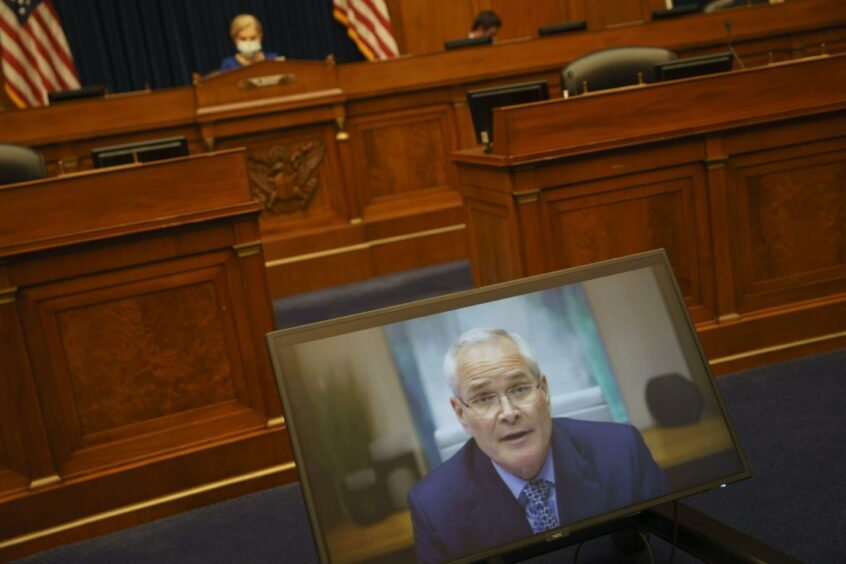
The first ever US congressional dressing down of oil bosses for alleged climate-change subterfuge devolved into a fractious spat over environmental racism, electric-car subsidies and fat pay packages.
The bosses of Exxon Mobil and Chevron, along with executives from Royal Dutch Shell and BP, were urged to resign on Thursday by progressive Democrats during a House Oversight and Reform Committee hearing. They also were pressured to abandon the leading oil-industry trade group and cut off funds to groups sowing doubts about climate science.
In the culmination of the seven-hour session, US Representative Carolyn Maloney, who chairs the panel, said the oil drillers will be subpoenaed to hand over documents and internal communications they’d failed to produce in preceding weeks. Instead, she said the companies buried committee staff in thousands of pages of publicly available material such as annual reports and website presentations.
It was the first time since BP’s Gulf of Mexico oil spill more than a decade ago that top industry executives appeared together before legislators in the nation’s capital. Lawmakers hoped to tease out statements that will aid lawsuits against fossil fuels as happened with Big Tobacco in the 1990s.
“They are obviously lying like the tobacco executives were,” Maloney, a New York Democrat, said after a particularly tense exchange with Exxon chief executive officer Darren Woods. “I was disappointed we heard much of the denial and deflection we’ve heard before.”
Climate bill
Lawmakers didn’t stay focused on climate disinformation for long and used their alloted speaking time to excoriate the executives for everything from federal oil-leasing programs to pollution in indigenous communities.
Representative Cori Bush blamed the oil industry for radioactive floodwaters she said inundated her St. Louis-area home. Other lawmakers criticized drillers for planning to increase oil output and warned that will exacerbate global warming.
“To me, this does not look like an adequate response to one of the defining challenges of our time,” Representative Katie Porter said while holding jars of M&Ms that represented spending on fossil fuels versus renewable energy. “This is greenwashing.”
The hearing came as President Joe Biden struggles to keep key climate policies in his spending bill, which is crucial to implementing the infrastructure goals that were a cornerstone of his campaign. Moderate Democrats and Republicans are blocking large portions of Biden’s climate efforts amid deep divisions within his own party ahead of a key climate summit in Glasgow begins next week.
Republicans defended the oil chiefs and pushed back against their Democratic colleagues.
“You’ve been brought here so they could beat the crap out of you,” Representative Andy Biggs of Arizona told the executives. “They’re doing it for a political reason, and that’s the shame of it all.”
Congressman Jim Jordan criticized some Democrats for discouraging domestic oil production at a time when the Biden administration has been asking OPEC to pump more.
“That may be the dumbest thing I’ve ever heard, but that’s the scenario we’re in,” said Jordan, an Ohio Republican. “God Bless Chevron saying they’re going to increase production. Do they want $8 gasoline, $10 gasoline, for the very families that we all represent? This is craziness.”
Looking back
Maloney presented Exxon’s Woods with a series of documents and statements from Exxon’s own scientists that fossil fuels were the main man-made cause of climate change as far back as 1978 and contrasted them with the company’s public statements.
She particularly emphasized former Exxon CEO Lee Raymond’s skeptical comments about the state of climate science in the 1990s.
“No I do not agree that there was an inconsistency,” Woods said. Exxon’s scientific understanding was “entirely consistent” with the wider scientific community and has evolved over time, he said. “I don’t think it’s fair to judge something 25 years ago with what we’ve learned since then.”
Greenpeace video
But that did not satisfy Maloney, who played a clip of former Exxon lobbyist Keith McCoy caught on camera by Greenpeace saying the company worked with “shadow groups” to combat climate science.
Gretchen Watkins, president of Shell’s U.S. subsidiary, told lawmakers that as early as 1991 the corporation was raising concerns about climate change and created an educational film on the topic for schools and universities.
“Shell has long advocated for governmental policies that will reduce fossil fuel demand, stimulate innovation in clean energy technologies, reduce greenhouse gas emissions, and ensure access to reliable and affordable energy,” Watkins said in written testimony.